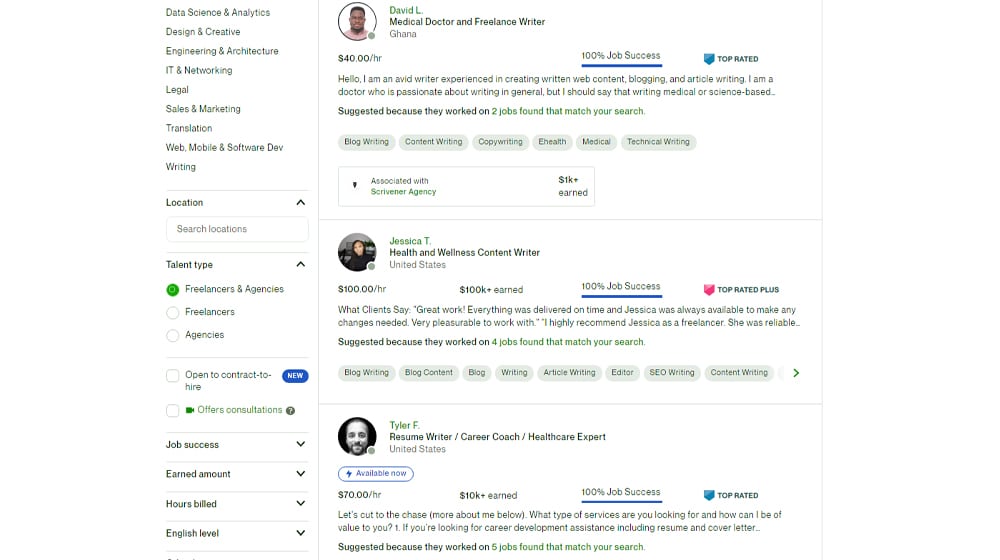Healthcare is a very important and very competitive niche for online marketing and blogging. Whether you're a health enthusiast looking to write about your life (via ghostwriters), a business in the health and supplements field, or a medical news and science site, you need someone to write your blog who knows what they're doing.
 So, how can you find and hire someone to write for a healthcare website the right way?
So, how can you find and hire someone to write for a healthcare website the right way?Here's our process.
The first thing you need to do is define your business. While it might sound obvious – you already know what your business is, right? – defining it in written terms allows you to present who you are to prospective writers.
This is important in the healthcare niche for a variety of reasons. Healthcare is such a broad topic, after all. A writer might know a lot about vitamins, health foods, supplements, and a vegan diet, and they'd be great if you're a supplement store, but they won't know what to do if you're writing about a kidney-friendly diet or about advanced elder care or about new developments in transplant technology or even just about skincare, necessarily.

There's also a variety of moral issues at play. A vegan writer might not want to write for a keto blog. Someone who doesn't believe supplements do much of anything might not want to write for a vitamin store. This doesn't even get into "alternative medicine" and assorted forms of quackery, and where different people's definitions of those draw the line.
So, define your business, what kinds of topics in general you'll want written, what kind of perspectives you promote and decry, and condense it down into a couple of short paragraphs. You don't need excessive detail here; this is just a meet-and-greet for the writer and you to see if you can even work together.
Another step you need to take is deciding what your needs will be. You don't need to pick something extreme right away – there's always room to scale later – but you want to have a good idea of what you're going to be asking of your writers.

First, figure out what kinds of content you're going to be outsourcing. Will it be blog posts? Landing pages? Service pages? Ad copy, social media posts, even product descriptions? All of these have special skills associated with them. This is especially true in healthcare, where there are additional rules for marketing and content, as well as industry regulations and laws in play.
Consider, as well, specifications about the content. Particularly for blogging, there's a world of difference between one 1,500-word post per week and three 2,000-word posts per week. The amount of time, attention, and care necessary to produce higher volumes of longer, high-quality content grows more than just the sum of the content itself.
Before going too much further, you may want to decide whether or not all you need is a writer.
 A good content production team is about more than just the writing. It's a collaborative effort between a writer, a graphic designer, an editor, and a blog manager. Some of these roles you can take on yourself – blog management in particular – but others need to be hired or outsourced.
A good content production team is about more than just the writing. It's a collaborative effort between a writer, a graphic designer, an editor, and a blog manager. Some of these roles you can take on yourself – blog management in particular – but others need to be hired or outsourced.In addition to looking for a writer, you might use the same information and definitions you put together above and look for these other roles as well. Editors are very useful, blog managers can help ensure that your marketing is cohesive and effective, and graphic designers ensure that you're not stuck using stock images for everything.

If hiring for all of these roles at once sounds like a tall order – and it is, don't get me wrong – you might also consider hiring an agency instead. Agencies remove a lot of the direct control you have over your blog, but they bring the total package to your doorstep. You talk with them about what you want your blog to contain, and they leverage their own resources and specialist writers to create that kind of content.
Agencies are highly effective but also tend to be more expensive, especially for a highly specialized and regulated industry like healthcare. If you can get a good deal going, great! If not, you may be stuck going back to a team of freelancers. There's nothing wrong with that, of course, it's just often more work organizing your teams yourself.
When you're looking for writers, it's worthwhile to look in the right places.
Healthcare writers – at least, those who have real experience and education on the subject – aren't going to be the kinds of people lurking on the content mills. Sites like Textbroker will be able to get you basic content and content spun off from existing content out there, but anything that requires more medical education or deeper industry knowledge (which is necessary to speak with expertise) isn't going to be available for $21 per 1,000 words.
Generally, you're going to want to look in a few specific kinds of places.
First, you can check the freelance hubs, like Upwork and Freelancer. These sites tend to have a variety of mid-level professionals in their writer rosters, and the medical and health specialists will know those skills are in demand and will put them in their profiles. It's relatively easy to find them through those sites, and then you just have to win them over with your pitch.

Second, you can try general job sites. Putting out a job ad looking for an expert healthcare writer will have a reasonable chance of finding you applicants with the relevant skills, though you'll have to do more filtering yourself.
Third, you can look for professionals who have their own websites. Some freelance writers, especially specialists in tricky niches, set up their own sites and advertise their services. They're very skilled and will likely produce excellent content for your site… if you can afford them. These are the cream of the crop, and they know it.
Finally, you can reach out to existing healthcare specialists or healthcare bloggers in your niche and ask if they'd be interested in working for you. In some cases, you may identify healthcare professionals dissatisfied with their careers who might want to branch out or find healthcare bloggers who might like another source of income.
Contracting with these people might have additional considerations. For example, maybe they would prefer an author citation over more money, to grow their own personal brands. It's up to you, of course, if you accept this trade-off.
When reviewing and interviewing your writer candidates – whether they came to you or you came to them – you'll want to do a subject matter interview. This helps you determine that the prospective writer knows at least enough about their subject to be able to write about it with authority. You don't want a writer creating authoritative, factual content on a subject they're researching off the cuff, right?
Truthfully, you can get away with the latter as long as the writer is good at what they do. They just need to know where to go to research their subject, which sites and resources to trust and which not to, and so on. It's entirely possible to hire a writer who is a generalist and train them to be experts in your particular field of healthcare.
As an additional note, you may consider one additional person for your team, and that's a fact checker. A fact checker is a professional and authority, usually with some level of actual certification and history in the field (so, a doctor, nutritionist, or other expert), who is willing to lend their identity to verification of your content. They review what you and your writer claim, make sure it's accurate, and lend their stamp of authority to it. That way, your readers know that the content they're reading has been fact-checked and is authoritative and accurate. You can even use Schema to get rich markup in Google for it.

The second interview to do is a review of YMYL. All you really need to do is ask if the writer is familiar with the YMYL algorithms and if they can demonstrate adherence to the rules.
What is YMYL? YMYL stands for Your Money or Your Life. It's a set of rules Google put in place for healthcare, finance, and other related sites. Essentially, it holds them to a higher standard in terms of factual accuracy, citations, trustworthiness, and expertise.
Google put this in place to help prevent medical misinformation and snake oil sites from gaining traction. After all, if a DIY site gives bad information, a reader could waste some materials, but if a medical site gives them bad information, they could lose their lives. It's a very important level of responsibility, and Google is trying to treat it more seriously.
Writers who pass your interview process should be given a test project.
A test project is, essentially, just a real writing assignment. You want it to be, more or less, as close to the actual process you'll be using to create content as possible. Exceptions might include giving it a longer deadline, being pickier than you normally might be about grammatical errors and typos, and other such tweaks. The idea, though, is to see if the writer can perform in the role.
Remember, the writer is also interviewing you here. If they don't like your process or your feedback, they have just as much leeway to choose not to work with you. You need to put your best foot forward. Likewise, they will be putting their best effort into the first projects they do for you.

Make sure you pay for your test project. One of the most common ways companies exploit writers is by requesting test articles, and then never paying for them and never hiring the writer; they simply use the test articles from dozens of writers over time and put out another round of applications when they need more. For obvious reasons, seasoned veteran writers tend not to give clients like this the time of day.
When you get your test writing in, evaluate it as you would any writing you would consider publishing. Does it adhere to your requirements, style, and tone? Does it promote what you want it to promote? Is it accurate and factual, and supported by your other site content? Does it make the proper use of the right keywords? Does it pass Copyscape, Grammarly, and other checks?
At this point, you should have one or more good writer candidates. Now you have a decision to make: who do you hire?
You are, of course, free to hire more than one writer. In fact, this is generally encouraged if you have the budget to spare. It gives you leeway in case one has an issue and can't keep working, and it allows you to have multiple voices, perspectives, and sources of expertise on your content team.
Alternatively, you can rely on one writer to handle your marketing and work with them until the relationship ends for one reason or another. The choice is yours.

One final step is to make sure you write up and sign a contract. Contracts are an important part of freelance writing. They offer protection for both you and your writer, ensure terms that you both agree on, and serve as a legal framework in case there's a violation along the way. The best contracts are never necessary, but they should still exist in case they need to be used.
Have any questions? Want to hire writers directly from my site? Either way, please feel free to reach out. I've worked to make my blog full of excellent resources for writers and for clients, and I'm always happy to answer questions and work with you as needed to make sure you get your writing journey started.